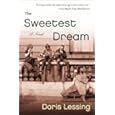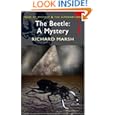Cross-posted at Of Books and Bicycles.
I think I may be a new Patrick Hamilton fan. I found his novel The Slaves of Solitude (which is the latest Slaves of Golconda pick) really dark and sad, but in a satisfying kind of way, the kind of satisfaction you feel when you've faced something difficult head-on, without flinching. The picture the novel paints of life generally, but especially life during war-time, is of isolation, irritation, boredom, misunderstanding, and deprivation.
The novel tells the story of Miss Roach -- we learn in the middle of the novel that her name is Enid but the narrator never calls her this -- who is 39 and single and has moved from London to the outer reaches of the suburbs to escape the bombings of World War II. She lives in the Rosamund Tea Rooms, a boarding house, and commutes to her secretarial job in the city. The atmosphere in the Rosamund Tea Rooms is depressingly claustrophic, and most of the novel is set here, or, when the scene changes, it's to take us to a nearby pub where people drink to escape or to take us out on the streets where Miss Roach walks, again, in order to escape.
What she's escaping, besides the general claustrophia, are her fellow boarders, one of whom, Mr. Thwaites, is an absolutely horrible person. He terrorizes Miss Roach and intimidates everybody else. Here's how the narrator describes him:
In his large, flat, moustached face ... in his lethargic yet watchful brown eyes, in his way of walking and his way of talking, there could be discerned the steady, self-absorbed, dreamy, almost somnambulistic quality of the lifelong trampler through the emotions of others, of what Miss Roach would call "the bully." That steady look with which as a child he would have torn off a butterfly's wing, with which as a boy he would have twisted another boy's wrist, with which as a man he would have humiliated a servant or inferior, was upon him as he now looked at Miss Roach; it never entirely left him.
Miss Roach hates Mr. Thwaites, but it never does her any good; he can always win any argument they have and can always get a reaction out of her and force her to answer his questions even when it's the last thing she wants. He's a nightmare -- the kind of person you wouldn't mind strangling, and who knows you feel that way and enjoys it.
Into this situation come two new people who offer a chance for some diversion and change, and possibly even improvement. Given the darkness of the initial scenes, though, we should be suspicious. One of these is Vicki, a young woman born in Germany who has lived in England for many years now, but who is still under suspicion because of her accent and her origin. Miss Roach stands up for her and befriends her, and then brings her into the boarding house, thinking that not only can she help Vicki, but Vicki might help her by changing the atmosphere in the the Tea Rooms.
The other is an American soldier who flirts with Miss Roach and soon enough becomes "her" soldier, implying that he wants her to return to America with him and help him run his laundromat business. Miss Roach is uncertain what she thinks of all this, but so little has happened to her of any interest at all, that she goes along with it in a bemused kind of way, just to see.
But her hopes are dashed as she figures out what kind of people Vicki and her American soldier really are. The rest of the novel charts just how bad these relationships can get.
What I particularly loved about this book is the way Miss Roach is such a careful observer of the people around her and the way the narrator takes time to describe the characters' words and emotions so closely. It's a story told through small scenes and little conversations, the kind of novel where tone of voice and word choice and facial expressions carry most of the plot. It's a novel about war, but not about battles and armies; in fact, Miss Roach avoids hearing war news whenever she can. Rather, it's about how war infects everything, right down to the words people use in everyday conversation and to the words on street signs:
To the endless snubbing and nagging of war, its lecturing and admonitions, Miss Roach was subjected from the moment she left the Rosamund Tea Rooms in the morning to the moment she returned at night, and these things were at last telling upon her nerves and general attitude.
Immediately she stepped forth into Thames Lockdon ... the snubbing began with:
No Cigarettes
Sorry
in the window of the tobacconist opposite.
And such was Miss Roach's mood nowadays that she regarded this less as a sorrowful admission than as a sly piece of spite. The "sorry", she felt certain, had not been thrown in for the sake of politeness or pity. It was a sarcastic, nasty, rude "sorry". It sneered, as a common woman might, as if to say "Sorry, I'm sure", or "Sorry, but there you are", or "Sorry, but what do you expect nowadays?"
This passage indicates the book's sensitivity to language, which is another thing I loved about it. Miss Roach is always thinking about the language other people use and how that language tells her something about who they are. This is especially true of Vicki, who irritates Miss Roach horribly by using out of date slang in an effort to keep from sounding too German. And Miss Roach is very sensitive about the language people use to describe her, hating it when people imply she is an "English Miss," too prim and proper and uptight to have any fun. And she can't stand it when people make fun of her name. One of the book's worst moments is when Mr. Thwaites says,
"Enter Dame Roach! ... Dame Roach -- the English Miss! Miss Prim. Dame Roach -- the Prude ... the jealous Miss Roach."
The thought that Vicki might have overheard this horrible string of words is enough to make her sick.
So, no, this is not a happy book, but it captures the hardships of wartime, and also of loneliness and sadness and solitude, beautifully, brilliantly well.



















